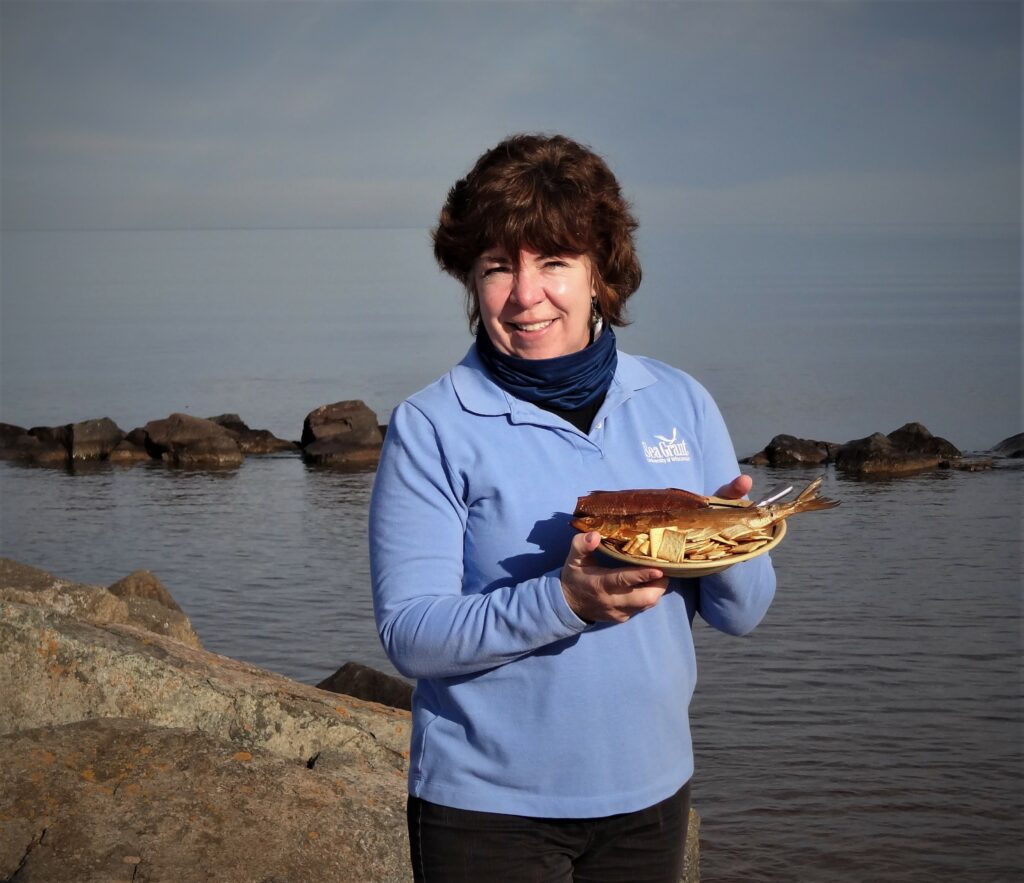By Eva Ryan, University of Wisconsin-Madison
Continuing Wisconsin Sea Grant’s 50th anniversary blog series, I interviewed Sharon Moen, the Eat Wisconsin Fish outreach specialist. During our time together, we discussed the past, present and hopes for the future of producing fish in Wisconsin for local and global consumption.

Sharon Moen holds smoked fish on the shores of Lake Superior. Image credit: Marie Zhuikov, Wisconsin Sea Grant
“I’m having fun with the position because I get to use my science communication skills to help American food-fish aquaculture and fisheries succeed against a challenging and changing global backdrop,” Moen said. “It feels like meaningful, important work.”
Moen’s work largely focuses on supporting food-fish aquaculture and fisheries in Wisconsin, which includes improving consumer awareness and acceptance. She explores topics of fish production, consumer demographics and how to connect local fish growers with people throughout the state.
Moen reports that commercial fishers were hampered by labor shortages last year and would like help navigating changes to state regulations. Her conversations with Wisconsin’s growing aquaculture industry indicate they could use technical help in the form of research on specific topics, finding fish processors and marketing.
“So many good things have happened in the last 50 years,” said Moen, starting with the commercial fishing industry of the Great Lakes: “The state’s commercial fishing industry was almost wiped out because of the invasion of sea lamprey, overfishing and changes to the ecosystem.” But due to progressive sustainable fishery management decisions, the fisheries have recovered, maintaining opportunities for people to make a living from plying the Great Lakes for food.
“It’s interesting to see how the industry has changed and how generational fishing families have held on and retained optimism. This is most evident in the way that, during the worst of the pandemic in 2020, the Red Cliff Band of Lake Superior Chippewa opened a fish processing and marketing business to help their members. It is encouraging to witness how the Great Lakes can still provide food and livelihoods for people.”
Similar to Great Lakes fisheries, the Wisconsin aquaculture industry has experienced many advances in the past 50 years. “We grow shrimp on old dairy farms now,” Moen said. “The largest on-land aquaponic facility for salmon is in Hixton, Wisconsin. Fifty years ago, people would think you were crazy if you said we were going to grow salmon on land and shrimp in old barns.” Moen goes on to applaud the innovation of aquaculture specialists, noting how exciting it is to observe the industry changing.
As industries continue to change, it only makes sense to look forward. When asked about the future of food fish production in Wisconsin, Moen was sure to touch on climate change and aquaculture’s role in improving food security and environmental resilience in the next 50 years.
“Already about half of the seafood Americans consume is raised on farms,” she said. “These farms could be, and maybe should be, down the road instead of halfway across the planet.”
The meat industry is a known contributor to carbon emissions and Earth’s changing climate. Moen specifically mentioned the feed conversion ratio of cows, pigs, and chickens. Compared to these animals, the feed conversion ratio of fish is significantly lower, effectively saving resources while providing an impressive yield of protein and essential nutrients for brain development in children and heart health.
“I think fish are going to be one of our most important sources of protein in the near future, especially as we get better at growing them in contained facilities. As people coming to terms with technology, where their seafood comes from and climate change, these changes have to happen.”
Further research on the food sources we use for feeding fish are being conducted each day. For example, scientists are trying to determine how we can grow algae containing omega-3 fatty acids and other beneficial nutrients to feed fish. That way, when we eat the fish that consume these algae, we also reap the benefits of those nutrients. All in all, the advancements taking place in the aquaculture industry are bountiful and exciting.
Considering the human health and environmental benefits of being a piscivore, Moen summed it up best when she said, “Eat fish, people!”


